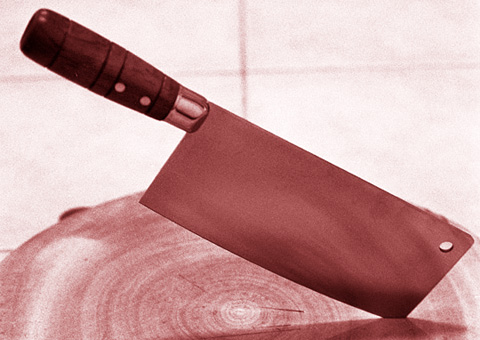Carving the Butcher
Thanksgiving in Harbin – by Rachelle Felzien
A VERSION OF THIS STORY FIRST APPEARED IN FAR ENOUGH EAST
It was my first Thanksgiving in China, and in Harbin winter had just begun to hit full stride. At Wal-Mart, they had roast turkey on special and seasonal decorations taped to the glass of the deli display cases – Precious Moments-style pilgrims alongside piles of vegetables and fried silkworms.
Browsing in the bakery aisles, I was jolted by a tremendous kerfuffle at a nearby butcher’s stand, where a crowd was quickly gathering. All background activity fell to silence as onlookers settled into place, but my view was maddeningly obscured. I moved in closer to try and see.
A man working at the stand and an older woman, presumably a customer, were screaming at each other with such explosive anger that it was, at first, more surreal than frightening. Over their cresting efforts to outshout one another, I became aware of a hard, repetitive banging. It sounded like the man was slamming his fist down on the table, but as I edged closer, the source of the sound came into view – he was bashing a massive, steel meat cleaver into the chopping surface as though he were hacking a side of pork to slivers. His movements were unstable, his voice throttled by emotion, and his face grossly contorted. Enraged enough to hold her ground within swinging range of the cleaver, the woman was terrifyingly close, tendons bulging from her neck as she spat vulgar insults, one after another.
Members of the management were cautiously hurrying in from their respective departments. They took their places on the fringes, none too keen on diving into the centre and staging an intervention. The two other employees who worked alongside the butcher at the the table kept up their normal duties, trying to maintain the appearance of normalcy even though their safety was in unquestionable danger. They didn’t back off on their own accord – they were bodily pulled away by a few of the closest onlookers, perhaps at the whispered behest of the management.
The butcher was now openly brandishing his cleaver as a weapon, demonstrating its abilities by hacking into the tabletop with wild abandon. He was beating out his rage in hot desperation, venting his anger on the laminate top of the carving table. The woman lost her nerve and backed down, but the man did not stop screaming, though he had worn himself down to the point where all he could muster were harried cries. Something in him had snapped, and though I feared his instability, I felt an even greater sympathy.
I speculated about the man’s life – what was his pain? Was he mentally ill? Or perhaps there was no reasonable justification at all. Perhaps, for him, explosive bouts of howling rage were an ordinary occurrence. It appeared to have been a petty squabble with a customer that had triggered this psychological breakdown, but there were no other clues from my present view of the fray as to how this had all come about.
For a few more long moments the man hacked in silence, his cleaver’s steel blade glinting in the flourescent lighting each time he raised it. But his movements were growing sluggish; he’d spent his energy and was winding down. Still, no one in the crowd dared anything above a whisper. Several managers had quietly pushed their way through and were standing motionless, watching with concern – aghast, perhaps, at what this might do to the reputation of their store.
We in the crowd loosened somewhat, in the understanding that the butcher had worn himself down and was no longer dangerous. We let our shoulders were down and took chest breaths, but remained silent, feet bolted to the floor. The managers alternated between approach and retreat until the butcher resigned, set the knife down and took two long strides away from it.
Immediately on the moment of his surrender, those nearest the table rushed in. Managers and other staff members closed in and escorted him to the back, where police were sure to arrive at any moment. The crowd’s mass shifted from solid to vapor as we dispersed in noisy confusion, shopping carts and elbows everywhere.
As soon as the butcher had been ushered away – the woman was nowhere to be found – everyone who had been stuck at the back during the excitement hurried up to get a closer look at the scene. I joined them, but found nothing new. The cleaver lay where it had been abandoned, shining brightly in a scattering of julienned bits of pork.
I was only able to look for a few seconds before the queue of onlookers pressed at my back, each jostling for a tableside position. I took my basket, and carried on with Thanksgiving.
•
Rachelle Felzien, from Michigan, sought language and adventure in Northeast China for a year a half after graduating. She found them


















